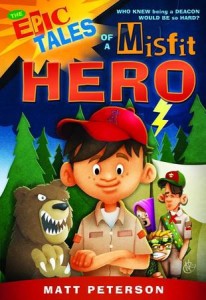A guest post by Matt Peterson.
 There’s a quote by Shakespeare that I really like to use. I like to use it for a few reasons. Mostly, it makes me sound smart, quoting Shakespeare and all. But it also encapsulates my life’s learning down into one sentence.
There’s a quote by Shakespeare that I really like to use. I like to use it for a few reasons. Mostly, it makes me sound smart, quoting Shakespeare and all. But it also encapsulates my life’s learning down into one sentence.
Here it is, from Measure for Measure:
“Our doubts are traitors, and make us lose the good we oft might win by fearing to attempt.”
I kinda have a history with “fearing to attempt.” At least I used to.
I wrote a blog post awhile back about getting cut from the junior high basketball team. At the time, I didn’t want to attempt anything else, ever. That was enough failure to last several lifetimes.
But then I did something crazy—I went out for the wrestling team. It actually turned out to be a decent success. Not the letter-jacket-and-tons-of-dates-and-a-college-scholarship type success, but something…similar. Ish.
The point is, until I attempted something new, I would have stewed in the same cauldron of mediocrity that got me cut from the basketball team in the first place. And I wouldn’t have gone anywhere. It set me up for success later in life, and I’m forever grateful.
Now, you’d expect fear to dwell with a 12-year-old. “Fearing to attempt” is as rampant in the halls of middle school as too much perfume (girls) or too little deodorant (boys). It’s universal. And that’s normal.
But eventually, we have to move past that mentality (and start taking more showers).
Are we attempting new things often, now that we’re all grown up? And I’m not talking about trying new things. Everyone can plug their nose and try some new piece of sushi, or listen to a new radio station on the drive home, or even read a new book someone recommended. But that’s not really attempting anything.
Attempting something has to include the threat of some good ol’ fashioned fear. And that might keep some of us outside the gate looking in.
But the fear doesn’t have anything to do with the outcome. The beauty of attempting is that it’s always wide-open as far as outcome. Fear won’t change the outcome, just the probability of starting. Anything can happen once the attempt is made.
In fact, all successes at one point were mere attempts, and success can’t come until after an attempt. Hmmm.
Oh yeah, and with attempts, the crazier the better.
Here are some of the things I’ve attempted in my life:
Run a marathon. Publish a book. Marry the girl of my dreams. Start my own business. Replace the alternator in a 98 Nissan Sentra.
Each of these things was scary, crazy, and against my better judgment. There was a decent amount of fear involved before the attempt. But the payoff, or as Shakespeare put it, the “good [I] might win” was worth an attempt. So worth it.
Now is the time to set some goals and make some attempts. Real, honest-to-goodness attempts at something worthwhile. Something crazy. Something big. Something small. Something important. Whatever.
But let’s make 2014 about the things we’ve never done, never thought of doing, or never imagined ourselves doing.
Think of the big attempt you’d like to tackle, then break it down into manageable chunks. If you want to finish a novel as your big attempt, great! How many pages are you going to write each week? When are you going to have an outline done? Are you going to attend any workshops or conferences? What books are you going to read? And so on.
Start big. Dream big.
But plan small. Execute small.
And your attempt will be a success.
Just think of all the good waiting for you in the world. There is so much we can do if we simply attempt something. And there is so much we will miss if we are afraid to try.
Our doubts are traitors, indeed. Sentence them to exile. Never let them back.
And unless you’re attempting to ask Jenny Anderson to the 7th grade dance right after P.E. class, you have nothing to fear.
Guest Writer Bio:

Matt Peterson is the author of
The Epic Tales of a Misfit Hero (Bonneville, 2012). His day job is running the copy and video department for Infusionsoft’s in-house creative agency. He lives in Mesa, AZ with his wife and 5 kids. He loves the outdoors, sports, movies, books, traveling, and hanging out with his family. He doesn’t like onions, nor make any apologies for disliking them. In his spare time he runs a free neighborhood sports league for kids.
![black-32834_640[1]](http://www.fictorians.com/wp-content/uploads/2014/02/black-32834_6401-174x300.png) February. The month that Greeting Card companies and Flower Stores wait for each year. The month where love and passion rule, and all things are possible. Where your true love holds you close and rips your heart out of your chest, still beating, to show you before you die. And why not? Every good novel needs some tension to balance the mushy love parts, right?
February. The month that Greeting Card companies and Flower Stores wait for each year. The month where love and passion rule, and all things are possible. Where your true love holds you close and rips your heart out of your chest, still beating, to show you before you die. And why not? Every good novel needs some tension to balance the mushy love parts, right?

